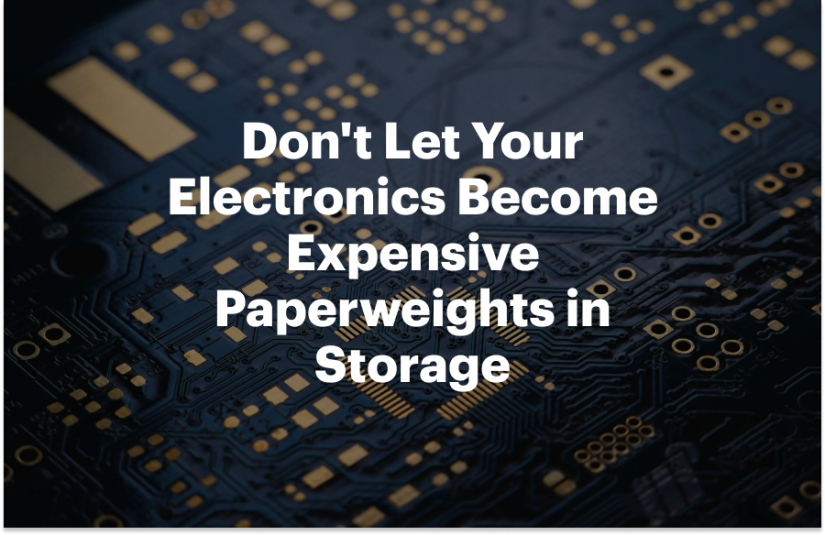Don't Let Your Electronics Become Expensive Paperweights in Storage
We've seen too many people pull expensive electronics out of storage units only to discover they've turned into expensive junk. Laptops that won't boot up, TVs with weird lines across the screen, and gaming systems that sound like jet engines when they try to start. The worst part? Most of this damage could've been prevented by storing electronics properly.
Electronics are tricky because they seem durable, but they're actually pretty sensitive to temperature changes, humidity, and dust. After helping Inman customers deal with successful electronics storage and costly mistakes, we've learned what actually works and what's just wishful thinking. Here's what you need to know about storing electronics in storage units so they work when you need them again.
Clean Everything Before Storage
Dust is electronics' worst enemy in storage, and most people don't clean their stuff properly before putting it away. That layer of dust on your TV screen or computer vents isn't just cosmetic. It can cause serious problems when equipment sits for months, and then you try to boot up your system. Use compressed air from a can to blow out all the vents, ports, and connections. Wipe down screens with appropriate cleaners. Remove dust from keyboard keys and around buttons. Clean the fans if you can access them safely.
It can be tedious, but dust combined with storage unit conditions can create a mess that's impossible to clean out later. Plus, you want to know your electronics are working correctly before you store them, not discover problems months later when you try to use them again.
Remove All Batteries
This is huge, and it's the mistake we see most often with electronics in storage units. Batteries left in devices can leak, corrode, and destroy expensive equipment while it's sitting in storage. Make sure to remove all batteries from your remote controls, wireless keyboards, gaming controllers, etc. To prevent battery degradation, even "permanent" batteries in laptops and tablets should be drained to about 50% charge before storage.
We've seen laptop batteries swell up in storage and damage the entire computer. We've watched TV remote controls destroyed by leaking batteries that corroded all the internal components. Five minutes of removing batteries can save you hundreds of dollars.
Store Your Devices Properly
Electronics need protection from dust, moisture, and physical damage in storage units. But you can't just throw plastic bags over everything and call it good. That actually makes things worse by trapping moisture. Consider using anti-static bubble wrap for screens and delicate components. Regular bubble wrap can create static electricity that damages electronics. For larger items like TVs, use furniture blankets or specialized electronics covers. Keep original boxes if you have them. They're designed specifically for protecting that equipment. Invest in proper electronics storage materials if you don't have the original packaging. Your expensive equipment deserves better protection than grocery store bags.
Store Everything Off the Floor
Electronics should be elevated off the floor. Concrete floors can conduct cold and moisture, and you want air circulation around your equipment.
Use pallets, shelving, or storage racks to keep everything elevated. Make sure there's space around larger items for air circulation. Don't stack electronics directly on each other. Make sure to use shelving or padding between items.
This is especially important for things like speakers, computer towers, and gaming consoles that have vents and fans. They need airflow even when they're not running, and being pressed against other items or sitting on concrete can cause problems.
What We've Learned About Electronics Storage
At Max Vault Storage Inman on 13060 Asheville Hwy, we've seen what works and what doesn't when storing electronics. Customers who achieve the best outcomes usually take the time to prepare their equipment properly.
We've also learned that different electronics have different storage needs. Gaming systems with optical drives need care that is different from that of solid-state devices. Older electronics with moving parts need more attention than modern devices.
The key is understanding what you're storing and planning accordingly. Don't treat all electronics the same, and don't assume that because something is expensive, it can handle storage conditions without proper preparation.
Electronics storage in storage units doesn't have to be risky if you do it right. Prepare everything properly, and don't cut corners on protection and cleaning.
If you're storing valuable electronics in the Inman area, come by Max Vault Storage Inman and let's talk about your best options. Your electronics are too valuable to gamble with, and proper storage preparation can save you from expensive surprises later.


